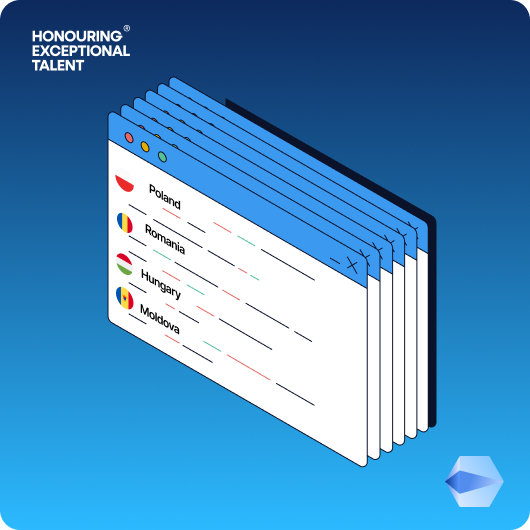6 Reasons Why You Should Start Hiring Software Engineers in Egypt
With 125,000 engineers, Egypt has the second largest tech talent market in Africa and some of the top performing computer science universities in the world. It’s an exciting market for any company looking to grow efficiently to consider.

When most people think about Egypt, they imagine ancient civilizations, pyramids and camels. They don’t think of innovation, startups and developer talent, but that’s exactly what Egypt has to offer.
The rise of remote working has changed the game for hiring tech skilled talent. Companies can now hire the best person for the job based on their merit, not their zip code. But there are still some limiting factors when hiring globally, for example, cost and time zone, and not every talent market is equal.
That’s why we at Carbon believe that Egypt offers unmatched potential for hiring software engineers: the talent is highly skilled, the market is large and rapidly growing, it’s very cost effective, the time zone is convenient for the US and UK, local employment laws favor companies, and employee attrition is naturally low.
Highly Skilled Talent
Education in STEM (science, technology, engineering and mathematics) subjects has long been prioritized in Egypt. There are even dedicated STEM schools where students are given a specialized education in these subjects as well as broader skills like creative thinking, effective communication and collaboration.
Unsurprisingly, many students go on to study STEM subjects at university. It’s there again, that the education system in Egypt excels. In Hackerrank’s analysis of university students’ skills in EMEA, universities in Egypt ranked first, second and fifth for JavaScript and second and fourth for SQL. Egyptian engineers are performing at a higher level than their counterparts in Sweden, Poland and Ireland, and they have both the technical and soft skills you need to build a strong team.
A Large and Growing Tech Talent Market
Historically, Egypt experienced a significant brain drain with thousands of talented engineers leaving to work in the US and Europe. But recently, foreign investment in Egypt has increased with big tech giants like Amazon, Siemens, IBM and Vodafone setting up offices in the country. Egypt is also particularly strong in the food delivery, last-mile and ride-hailing sector – as seen by Uber’s acquisition of MENA’s leading ride hailing app, Careem, meaning it now has an engineering hub in Egypt. As a result of this growing foreign investment, the brain drain has slowed down and Egypt now has the second largest talent market in Africa with over 125,000 professional developers.
The market is steadily growing, largely thanks to the heavy focus on education in STEM, and each year 60,000 ICT graduates enter the tech market which is one of the highest numbers in EMEA. Therefore, there’s a large pool of highly skilled developers looking for work and some of them have already worked for big tech companies.
Time Zone Alignment
One of the downsides to a globalized labor market is that time zones can be difficult to manage. A difference of a few hours can be an added bonus because it means working days are cumulatively longer and people can work with clients across multiple time zones. However, working with people who are ten or more hours out of sync can create roadblocks in your projects.
Egypt is GMT+2 which means developers there are very well aligned with companies across EMEA. There’s also no difference for companies in the US who already work with developers based in Europe. Added to this is the fact that Egypt has become increasingly more Westernised. Unlike other countries across MENA, most companies in Egypt have now shifted to a Western Monday to Friday work week instead of the country’s traditional Sunday to Thursday week. So, you can employ high-quality talent from Egypt without having to restructure the way you work.
Great Value for Money
The average cost of living in Egypt is 77% lower than the UK and 79% lower than the US so even a high local wage is lower than those in the UK and the US. At Carbon, the total cost of our Egyptian Senior Ruby Engineers is $4,750 per month; a fraction of the cost of the higher wages that we see in the West.
Employment contracts in Egypt are typically annual, or sometimes two-year, so rates are agreed at the start of the year and then renegotiated when the time comes to renew the contract. The Egyptian pound is going through a period of instability which means engineers who are hired by local companies and paid in Egyptian pounds risk their real earnings decreasing by 20 to 30% over the course of a year.
Therefore, you have a competitive advantage as a foreign company looking to hire distributed teams in Egypt and pay them in a reserve currency, like the US dollar. By paying your employees in this way, you can ensure that their real salaries aren’t impacted when the value of the local currency changes. Local employers can’t offer the same stability which gives you a stronger hiring value proposition than local employers and means you can attract and retain the best talent.
Carbon was able to capitalize on this by setting up a local entity in Cairo's over-subscribed ‘free-trade zone’ so we’re better positioned to competitively hire the most highly skilled, local talent.
Company-Centric Local Legislation
Employment laws in Egypt are much more company-centric than in Europe – notice periods are short and contracts are renegotiated annually, or every two years. As much as we always hope to retain talent, sometimes it sadly doesn’t work out. In Egypt, the process of dismissing employees is simple and companies aren’t faced with the severance packages typically seen in certain European countries, like France and The Netherlands. It’s much easier for companies hiring in Egypt to streamline their teams to be as efficient as possible.
The Egyptian government’s ICT 2030 strategy aims to revolutionize the country’s digital sector. The trade-free zone is just one example of the ways Egypt is working to encourage foreign investment and we expect to see many more initiatives in the coming years. There’s a massive tailwind to catch if you’re able to capitalize on the opportunities offered by the local legislation.
Naturally Low Attrition Rates
Finally, since Egypt is still relatively unknown as a tech talent market, the majority of companies looking to hire remote engineers source their talent from traditional technology hubs in countries like the US, UK, The Netherlands and Germany. As a result, there are fewer employment opportunities in Egypt so attrition is low because people’s heads aren’t as easily turned in more saturated markets. But even if there were more remote employment opportunities, socio-cultural norms would still ensure low attrition.
In the US, 69% of engineers stay at companies for less than two years and the picture is similar in Europe where they typically stay for around two years. This is a problem because high turnover delays processes and makes it difficult to build efficient, consistent teams. In contrast, in Egypt if developers find a good employer, they will stay there for 4 or 5 years which is unheard of in the US and Europe and double the typical employment length in those countries. So if you hire out of Egypt you can build dedicated teams over multiple years.
Uncover Exceptional Talent
Egypt is home to highly skilled developers who are on par with, and sometimes even outperforming, those in Europe. The local legislation and currency mean that as a foreign company, you have a competitive advantage. We have provided an easy way to access this talent by opening a Carbon development center in Cairo. As a fully-managed employer of record, we have unlocked access to North Africa’s most skilled engineers.
Get in touch today to start building out your cost-effective team from Carbon’s Consoleya Talent Hub in downtown Cairo.

Carbon is the go-to staffing specialist for Eastern European and North African technical talent. Trusted by the biggest names in technology and venture capital, Carbon’s hyperlocal expertise makes entering new talent markets for value-seeking global companies possible.
Honouring exceptional talent ®


.png)
